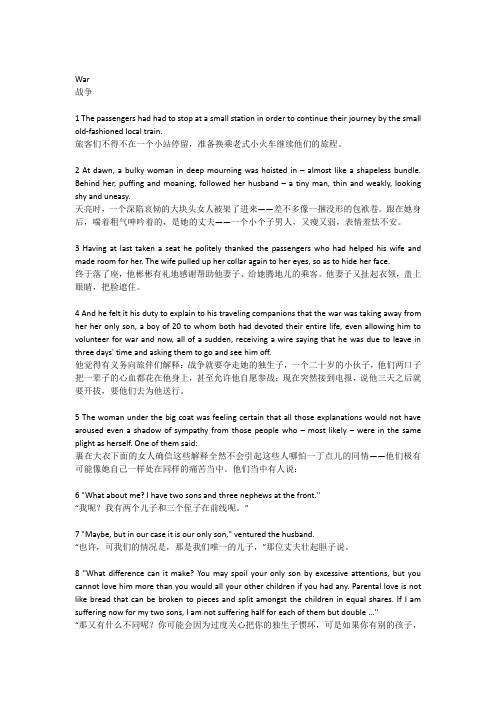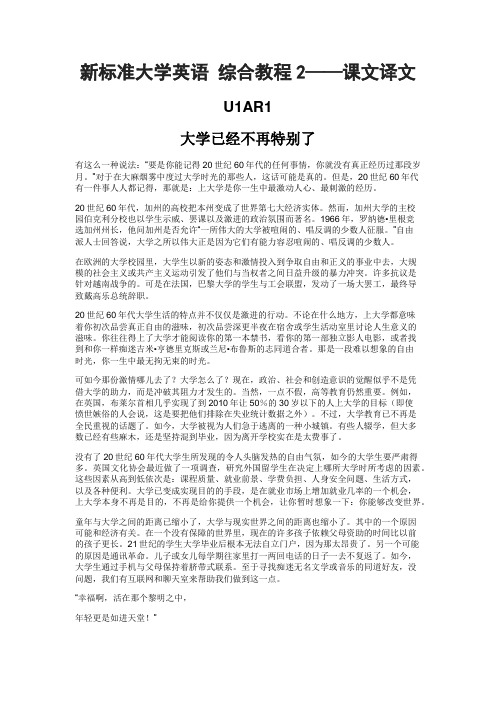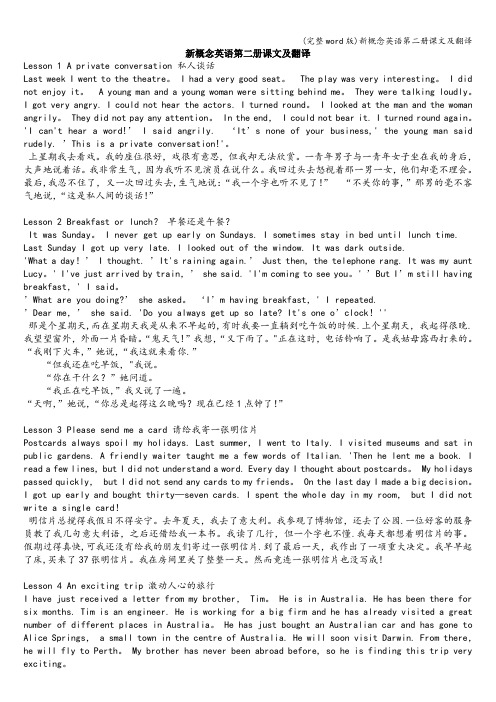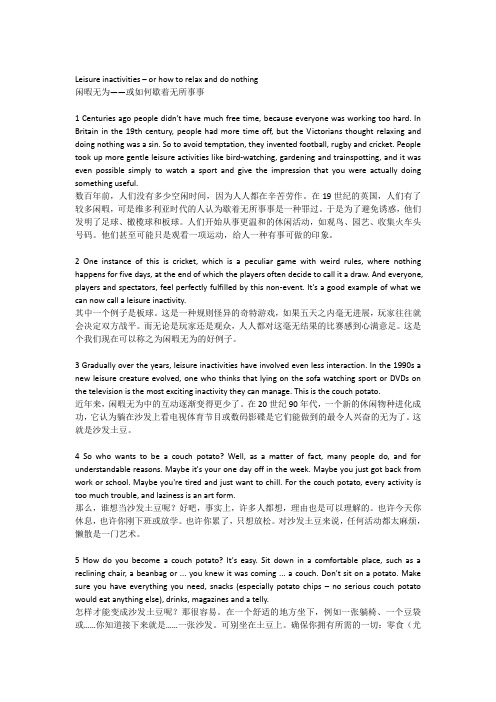(完整word版)新标准英语综合教程2课文翻译
新标准英语综合教程2课文翻译

新标准英语综合教程2课文翻译LTHow Empathy UnfoldsThe moment Hope, just ninemonths old, saw another baby fall, tears welled up inher own eyes and she crawled off to be comforted by her mother, as though it were she who had beenhurt. And 15-month-old Michael went to get his own teddy bearfor his crying friend Paul; whenPaul kept crying, Michael retrieved Paul's security blanket for him.霍普才九个月大,一见到另一个婴儿摔倒,泪水就涌了出来。
她爬到妈妈身边寻求安慰,就好像是她自己摔疼了。
15个月大的迈克尔去把自己的玩具熊拿来给正在大哭的朋友保罗;保罗不停地大哭的时候,迈克尔替保罗捡回他的安乐毯。
Both these small acts of sympathy and caring were observed by mothers trained to record such incidents of empathy in action. The results ofthe study suggest that the roots of empathy can be traced to infancy.Virtually from the day they are born infants are upset when they hear another infant crying –a response some see as the earliest precursor of empathy.这些小小的表示同情和关爱的举动都是接受过记录同感行为训练的母亲们观察到的。
新标准大学英语综合教程2课本翻译U2R1

War战争1 The passengers had had to stop at a small station in order to continue their journey by the small old-fashioned local train.旅客们不得不在一个小站停留,准备换乘老式小火车继续他们的旅程。
2 At dawn, a bulky woman in deep mourning was hoisted in – almost like a shapeless bundle. Behind her, puffing and moaning, followed her husband – a tiny man, thin and weakly, looking shy and uneasy.天亮时,一个深陷哀恸的大块头女人被架了进来——差不多像一捆没形的包袱卷。
跟在她身后,喘着粗气呻吟着的,是她的丈夫——一个小个子男人,又瘦又弱,表情羞怯不安。
3 Having at last taken a seat he politely thanked the passengers who had helped his wife and made room for her. The wife pulled up her collar again to her eyes, so as to hide her face.终于落了座,他彬彬有礼地感谢帮助他妻子、给她腾地儿的乘客。
他妻子又扯起衣领,盖上眼睛,把脸遮住。
4 And he felt it his duty to explain to his traveling companions that the war was taking away from her her only son, a boy of 20 to whom both had devoted their entire life, even allowing him to volunteer for war and now, all of a sudden, receiving a wire saying that he was due to leave in three days' time and asking them to go and see him off.他觉得有义务向旅伴们解释:战争就要夺走她的独生子,一个二十岁的小伙子,他们两口子把一辈子的心血都花在他身上,甚至允许他自愿参战;现在突然接到电报,说他三天之后就要开拔,要他们去为他送行。
《新标准大学英语 综合教程2》课文译文

新标准大学英语综合教程2——课文译文U1AR1大学已经不再特别了有这么一种说法:“要是你能记得20世纪60年代的任何事情,你就没有真正经历过那段岁月。
”对于在大麻烟雾中度过大学时光的那些人,这话可能是真的。
但是,20世纪60年代有一件事人人都记得,那就是:上大学是你一生中最激动人心、最刺激的经历。
20世纪60年代,加州的高校把本州变成了世界第七大经济实体。
然而,加州大学的主校园伯克利分校也以学生示威、罢课以及激进的政治氛围而著名。
1966年,罗纳德•里根竞选加州州长,他问加州是否允许“一所伟大的大学被喧闹的、唱反调的少数人征服。
”自由派人士回答说,大学之所以伟大正是因为它们有能力容忍喧闹的、唱反调的少数人。
在欧洲的大学校园里,大学生以新的姿态和激情投入到争取自由和正义的事业中去,大规模的社会主义或共产主义运动引发了他们与当权者之间日益升级的暴力冲突。
许多抗议是针对越南战争的。
可是在法国,巴黎大学的学生与工会联盟,发动了一场大罢工,最终导致戴高乐总统辞职。
20世纪60年代大学生活的特点并不仅仅是激进的行动。
不论在什么地方,上大学都意味着你初次品尝真正自由的滋味,初次品尝深更半夜在宿舍或学生活动室里讨论人生意义的滋味。
你往往得上了大学才能阅读你的第一本禁书,看你的第一部独立影人电影,或者找到和你一样痴迷吉米•亨德里克斯或兰尼•布鲁斯的志同道合者。
那是一段难以想象的自由时光,你一生中最无拘无束的时光。
可如今那份激情哪儿去了?大学怎么了?现在,政治、社会和创造意识的觉醒似乎不是凭借大学的助力,而是冲破其阻力才发生的。
当然,一点不假,高等教育仍然重要。
例如,在英国,布莱尔首相几乎实现了到2010年让50%的30岁以下的人上大学的目标(即使愤世嫉俗的人会说,这是要把他们排除在失业统计数据之外)。
不过,大学教育已不再是全民重视的话题了。
如今,大学被视为人们急于逃离的一种小城镇。
有些人辍学,但大多数已经有些麻木,还是坚持混到毕业,因为离开学校实在是太费事了。
(完整word版)新概念英语第二册课文及翻译

新概念英语第二册课文及翻译Lesson 1 A private conversation 私人谈话Last week I went to the theatre。
I had a very good seat。
The play was very interesting。
I did not enjoy it。
A young man and a young woman were sitting behind me。
They were talking loudly。
I got very angry. I could not hear the actors. I turned round。
I looked at the man and the woman angrily。
They did not pay any attention。
In the end, I could not bear it. I turned round again。
'I can't hear a word!’ I said angrily. ‘It’s none of your business,' the youn g man said rudely. ’This is a private conversation!'。
上星期我去看戏。
我的座位很好,戏很有意思,但我却无法欣赏。
一青年男子与一青年女子坐在我的身后,大声地说着话。
我非常生气,因为我听不见演员在说什么。
我回过头去怒视着那一男一女,他们却毫不理会。
最后,我忍不住了,又一次回过头去,生气地说:“我一个字也听不见了!”“不关你的事,”那男的毫不客气地说,“这是私人间的谈话!”Lesson 2 Breakfast or lunch?早餐还是午餐?It was Sunday。
I never get up early on Sundays. I sometimes stay in bed until lunch time. Last Sunday I got up very late. I looked out of the window. It was dark outside.'What a day!’ I thought. ’It's raining again.’ Just then, the telephone rang. It was my aunt Lucy。
新标准大学英语综合教程2课文翻译U5R1

Leisure inactivities – or how to relax and do nothing闲暇无为——或如何歇着无所事事1 Centuries ago people didn't have much free time, because everyone was working too hard. In Britain in the 19th century, people had more time off, but the Victorians thought relaxing and doing nothing was a sin. So to avoid temptation, they invented football, rugby and cricket. People took up more gentle leisure activities like bird-watching, gardening and trainspotting, and it was even possible simply to watch a sport and give the impression that you were actually doing something useful.数百年前,人们没有多少空闲时间,因为人人都在辛苦劳作。
在19世纪的英国,人们有了较多闲暇,可是维多利亚时代的人认为歇着无所事事是一种罪过。
于是为了避免诱惑,他们发明了足球、橄榄球和板球。
人们开始从事更温和的休闲活动,如观鸟、园艺、收集火车头号码。
他们甚至可能只是观看一项运动,给人一种有事可做的印象。
2 One instance of this is cricket, which is a peculiar game with weird rules, where nothing happens for five days, at the end of which the players often decide to call it a draw. And everyone, players and spectators, feel perfectly fulfilled by this non-event. It's a good example of what we can now call a leisure inactivity.其中一个例子是板球。
新标准大学英语综合教程2课文翻译

新标准大学英语综合教程2课文翻译My dream comes true梦想成真1 The rain had started to fall gently through the evening air as darkness descended over Sydney. Hundreds of lights illuminated Stadium Australia, and the noise was deafening. As I walked towards the track I glanced around me at the sea of faces in the stands, but my mind was focused. The Olympic gold medal was just minutes away, hanging tantalisingly in the distance.当夜幕降临悉尼时,雨也开始悄悄地从夜空中飘落。
几百盏灯把澳大利亚体育场照得灯火通明,场内的声音震耳欲聋。
走向跑道时我看了一眼四周看台上无数的脸,但我的注意力还是很集中。
再过几分钟奥运金牌的归属就要见分晓了,它悬挂在远处,很诱人。
2 My heart was beating loudly, my mouth was dry and the adrenaline was pumping. I was so close to the realisation of my childhood dream and the feeling was fantastic; it was completely exhilarating, but also terrifying. I knew I would have to push myself beyond my known limits to ensure that my dream came true.我的心在剧烈地跳动,口干舌燥,肾上腺素猛增。
新标准综合教程2课后翻译
新标准综合教程2课后翻译Unit 1 Friendship 友谊。
Part 1 Pre-reading Activities 预读活动。
1. Do you have a best friend? What do you usually do together?2. Do you think friendship is important in life? Why or why not?Part 2 Text Reading 文本阅读。
Friendship 友谊。
Friendship is one of the most important things in our lives. Friends are people we can rely on, share our joys and sorrows with, and confide in. A true friend is someone who understands us, supports us, and stands by us in difficult times.In the past, people used to make friends in their local communities or schools. However, with the development of technology, we can now make friends from all over the world through social media and online platforms. This has greatly expanded our social circles and allowed us to connect with people who share our interests and values.Part 3 Post-reading Activities 后读活动。
新标准大学英语综合教程2课文翻译U5R2
Painting as a pastime绘画消遣1 A gifted American psychologist has said,”Worry is a spasm of the emotion; the mind catches hold of something and will not let it go。
” It is useless to argue with the mind in this condition。
The stronger the will, the more futile the task。
One can only gently insinuate something else into its convulsive grasp。
And if this something else is rightly chosen, if it is really attended by the illumination of another field of interest, gradually,and often quite swiftly, the old undue grip relaxes and the process of recuperation and repair begins.一位天才美国心理学家说过:“烦恼是感情的发作;此时大脑缠住了某种东西不肯放手。
”在这种情况下,和头脑争论(让它放手)是无用的。
愿望越强烈,与之争论就越是徒劳。
你只能温和地将另一种东西慢慢灌输到痉挛状态的头脑中。
如果(这一东西)选得恰当,而且它真的从另一领域的情趣中受到启迪的话,那么逐渐地,往往也是迅速地,原先不适当的“不肯放手"就会慢慢放松,恢复和补救的过程就会开始。
2 The cultivation of a hobby and new forms of interest is therefore a policy of first importance toa public man. But this is not a business that can be undertaken in a day or swiftly improvised by a mere command of the will。
新标准大学英语综合教程2课文翻译U5R1
Leisure inactivities – or how to relax and do nothing闲暇无为——或如何歇着无所事事1 Centuries ago people didn't have much free time, because everyone was working too hard. In Britain in the 19th century, people had more time off, but the Victorians thought relaxing and doing nothing was a sin. So to avoid temptation, they invented football, rugby and cricket. People took up more gentle leisure activities like bird-watching, gardening and trainspotting, and it was even possible simply to watch a sport and give the impression that you were actually doing something useful.数百年前,人们没有多少空闲时间,因为人人都在辛苦劳作。
在19世纪的英国,人们有了较多闲暇,可是维多利亚时代的人认为歇着无所事事是一种罪过。
于是为了避免诱惑,他们发明了足球、橄榄球和板球。
人们开始从事更温和的休闲活动,如观鸟、园艺、收集火车头号码。
他们甚至可能只是观看一项运动,给人一种有事可做的印象。
2 One instance of this is cricket, which is a peculiar game with weird rules, where nothing happens for five days, at the end of which the players often decide to call it a draw. And everyone, players and spectators, feel perfectly fulfilled by this non-event. It's a good example of what we can now call a leisure inactivity.其中一个例子是板球。
新标准大学英语(第二版)综合教程2 Unit 1 A篇练习答案及课文翻译
Active Reading 1
Warming Up
Oral practice
Task 1: Talk about your college life
Task 2: Discuss questions
Watching and listening
Task 3: Dictation Task 4: Blank-filling Task 5: Answer the questions
2. How do you think it has changed?
Warming Up
Task 2 Work in pairs and discuss the two questions.
1. What do you think student life was like in the 1960s?
Warming Up
Watching and Listening
You are going to do three tasks on University of California at Berkeley. Learn some new words about it. flagship n. 旗舰 municipality n. 市政当局 acclaimed a. 令人称赞的 laureate n. 获奖者 Peace Corps volunteers 维和部队志愿者
4. What is the motto of UC Berkeley?
The university’s motto is Fiat Lux (Latin) or “Let there be light”.
Warming Up
5. What are UC Berkeley students taught to do? Berkeley students are taught to look at the world as how it ought to be instead of how it is or how it was. 6. What word can be used to define Berkeley students or faculty? Passion.
- 1、下载文档前请自行甄别文档内容的完整性,平台不提供额外的编辑、内容补充、找答案等附加服务。
- 2、"仅部分预览"的文档,不可在线预览部分如存在完整性等问题,可反馈申请退款(可完整预览的文档不适用该条件!)。
- 3、如文档侵犯您的权益,请联系客服反馈,我们会尽快为您处理(人工客服工作时间:9:00-18:30)。
How Empathy UnfoldsThe moment Hope, just ninemonths old, saw another baby fall, tears welled up inher own eyes and she crawled off to be comforted by her mother, as though it were she who had beenhurt. And 15-month-old Michael went to get his own teddy bearfor his crying friend Paul; whenPaul kept crying, Michael retrieved Paul's security blanket for him.霍普才九个月大,一见到另一个婴儿摔倒,泪水就涌了出来。
她爬到妈妈身边寻求安慰,就好像是她自己摔疼了。
15个月大的迈克尔去把自己的玩具熊拿来给正在大哭的朋友保罗;保罗不停地大哭的时候,迈克尔替保罗捡回他的安乐毯。
Both these small acts of sympathy and caring were observed by mothers trained to record such incidents of empathy in action. The results ofthe study suggest that the roots of empathy can be traced to infancy.Virtually from the day they are born infants are upset when they hear another infant crying – a response some see as the earliest precursor of empathy.这些小小的表示同情和关爱的举动都是接受过记录同感行为训练的母亲们观察到的。
这项研究的结果表明,同感的根源可以追溯到人的婴儿期。
实际上,从出生的那天起,婴儿在听到其他婴儿哭闹的时候就会感到不安——有些人认为这种反应是同感的最初先兆。
Developmental psychologists have found that infants feel sympathetic distress even before they fully realize that they exist apart from other people. Even a few months after birth, infants react to a disturbance in those around them as though it were their own, crying when they see another child's tears. 成长心理学家发现,甚至在充分意识到自己是独立于其他人而存在之前,婴儿就感受到了同情的苦恼。
甚至在出生后几个月,婴儿就会对周围人的烦躁不安做出反应,就好像他们自己的烦躁不安一样,看到别的孩子哭也跟着哭。
By one year or so, they start to realize the misery is not their own but someone else's, though they still seem confused over what to do about it. In research by Martin L. Hoffman at New York University, for example, a one-year-old brought his own mother over to comfort a crying friend, ignoring the friend's mother, who was also in the room. 到了一岁左右,他们开始意识到痛苦不是他们的,而是别人的,可是他们对这样的事情似乎还是感到不知所措。
例如,在纽约大学的马丁·L.霍夫曼所做的一项研究中,一个一岁的孩子把自己的妈妈拉过来安慰哭闹的朋友,却忽视了同在一室的朋友的妈妈。
This confusion is seen too when one-year-olds imitate the distress of someone else, possibly to better comprehend what they are feeling; for example, if another baby hurts her fingers, a one-year-old might put her own fingers in her mouth to see if she hurts, too. On seeing his mother cry, one baby wiped his own eyes, though they had no tears.这样的困惑在其他一岁大的孩子身上也能看到,他们模仿别的孩子的痛苦,也许是为了更好地理解他们的感受。
例如,如果别的婴儿伤了手指,一个一岁大的孩子就会把自己的手指放进嘴里,看看自己是否也感觉到痛。
看到自己的妈妈哭,婴儿即使没有眼泪,也会擦拭自己的眼睛。
Such motor mimicry, as it is called, is the original technical sense of the word empathy as it was first used in the 1920s by E. B. Titchener, an Americanpsychologist. Titchener's theory was that empathy stemmed from a sortof physical imitation of the distress of another, which then evokes the same feelings in oneself.这种所谓的运动神经模仿就是“同感”的原始字面含义,而“同感”这个词于20世纪20年代由美国心理学家E.B.铁钦纳首次使用。
铁钦纳的理论是:同感发自对他人痛苦的一种身体模仿;这种模仿继而在自身引起同样的心理感受。
He sought a word that would be distinct from sympathy, which can be felt for the general plight of another with no sharing whatever of what that other person is feeling.他当时在寻找一个与同情有所区别的词;同情是针对他人的一般困境而发的,无须分担他人的任何感受。
Motor mimicry fades from toddlers' repertoire at around two and a half years, at which point they realize that someone else's pain is different from their own, and are better able to comfort them. A typical incident, from a mother's diary:小孩两岁半左右就渐渐不再有运动神经模仿行为,那时他们会意识到别人的痛苦与自己的不同,会更有能力安慰别人。
下面是摘自一位母亲日记里的典型事例:A neighbor's baby cries and Jenny approaches and tries to give him some cookies. She follows him around and begins to whimper to herself. She then tries to stroke his hair, but he pulls away … He calms down, but Jenny still looks worried.She continues to bring him toys and to pat his head and shoulders.邻居家的婴儿哭了,珍妮走上前去,试图给他一些小甜饼。
她跟着他转,开始带着哭腔低声自言自语。
然后她试图抚摸他的头发,可是他躲开了……他平静下来,但是珍妮仍然面带忧色。
她继续给他拿来玩具,轻拍他的头和肩膀。
At this point in their development toddlers begin to diverge from one another in their overall sensitivity to other people's emotional upsets, with some, like Jenny, keenly aware and others tuning out.在这个年龄,幼儿对于他人感情波动的总体敏感度开始有所不同,有些像珍妮一样,感同身受,有些则不予理睬。
A series of studies by Marian Radke-Yarrow and Carolyn Zahn-Waxler at the National Institute of Mental Health showed that a large part of this difference in empathic concern had to do with how parents disciplined their children. Children, they found, were more empathic when the discipline included calling strong attention to the distress their misbehavior caused someone else:美国国家心理健康研究所的玛丽安·拉德克-亚罗和卡罗琳·察恩-瓦克斯勒所做的一系列研究表明,这种在同感关注方面的差异大部分与父母怎样教养子女有关。
她们发现,如果在家教中让孩子特别注意他们的恶作剧给别人造成的痛苦,孩子就比较有同感心。
